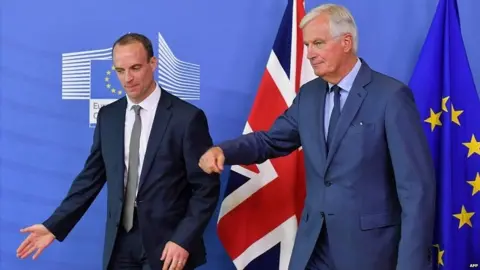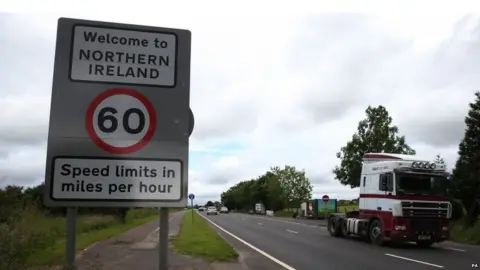Brexit: Raab and Barnier claim progress but no Irish breakthrough
 AFP
AFPBoth sides in Brexit talks say progress is being made but without any breakthrough on the crucial issue of the Irish border.
Brexit Secretary Dominic Raab said he was "stubbornly optimistic" about getting a deal after talks in Brussels.
Unresolved issues include intellectual property, data protection and the role of the European Court of Justice.
EU negotiator Michel Barnier said he needed detail from the UK on its plan to avoid a hard border in Ireland.
He told journalists that remaining "bones of contention" between the two sides were being steadily eliminated with particular progress on issues of security, judicial and defence co-operation after "long" talks on Friday.
The UK is due to leave the EU on 29 March 2019.
Both sides are hoping to agree a divorce deal and a statement on future trading relations at a summit of EU leaders on 17 October, although Mr Raab said that deadline could be missed slightly.
He told reporters: "We're committed to resolving the deal by (the October council) and ultimately on my side I am stubbornly optimistic that a deal is within our reach."
Mr Barnier said there was a "measure of flexibility" and if the process slipped by a "few days or weeks" it would still be possible for the UK to leave the EU with a deal, if approved by the UK and EU Parliaments, on schedule.
The EU negotiator said the "building blocks" of an agreement were falling into place.
He repeated his offer of an "unprecedented" future partnership with the UK but insisted this depended on an "orderly" withdrawal and settling key outstanding issues.
He said the question of the Irish border had come down to "minutiae" and he needed to see the detail of how the UK proposed to manage cross-border trade between Northern Ireland and the Republic of Ireland in the event of there being no other solution - the so-called backstop - would work in practice.
 PA
PA"This backstop is critical," he said. "It is essential to concluding the negotiations. Without a backstop, there will be no agreement."
Mr Raab said he had used Friday's talks to explain in more detail the UK's proposal for its future relationship with the EU, the so-called Chequers plan agreed by Theresa May at her country residence in July.
The PM's blueprint, which would see the UK follow EU rules on trade in goods, is unpopular with many Tory MPs, with leading Brexiteers like Jacob Rees-Mogg and Boris Johnson calling for it to be ditched.
Mr Johnson, who quit the cabinet in July in protest over the PM's proposals, said he agreed with Mrs May's former aide Nick Timothy, who urged her to ditch the plan.
Mr Timothy wrote on Thursday that she would have to make further concessions to get EU backing for it and this would be unacceptable.
Allow X content?
And Stuart Jackson, the former Tory MP who until recently was an aide to Dominic Raab's predecessor David Davis, said the Chequers plan "has not really got any friends" on either side.
"For the EU, it's outside their core principles and undermines the integrity of the single market," he told BBC Radio 4's Today. "In the UK, people believe it is Brexit in name only."
The two sides say they have agreed 80% of the withdrawal agreement. The remaining 20% includes:
- Irish border: The principle of a backstop was agreed in December but the detail has not. The UK says physical checks are unnecessary but the EU says the single market must be upheld
- Governance and implementation: What role will the European Court of Justice have in enforcing the agreement, including on citizen's rights, and what penalties can be applied if either side breaks it?
- Data: How will the data of EU citizens currently stored in the UK be protected?
- Geographical indications: How will the UK continue protections for regional products such as French champagne and Spanish manchego cheese?
- Criminal and judicial matters: How will existing co-operation on cross-border crime and money laundering be maintained and extended?
Mr Raab vowed to increase the frequency of talks with Mr Barnier when he took over the job.
But Labour MP Ben Bradshaw, a supporter of the People's Vote campaign for a referendum on the outcome of the negotiations, said "nothing had changed" since then.
"Dominic Raab may say he is more confident about reaching agreement but he can offer nothing concrete," he said.
"He knows the EU27 are not buying the Chequers car crash - a proposal designed around the need to hold a fractured government together and not on the economic interest and well-being of either the UK or the EU."
